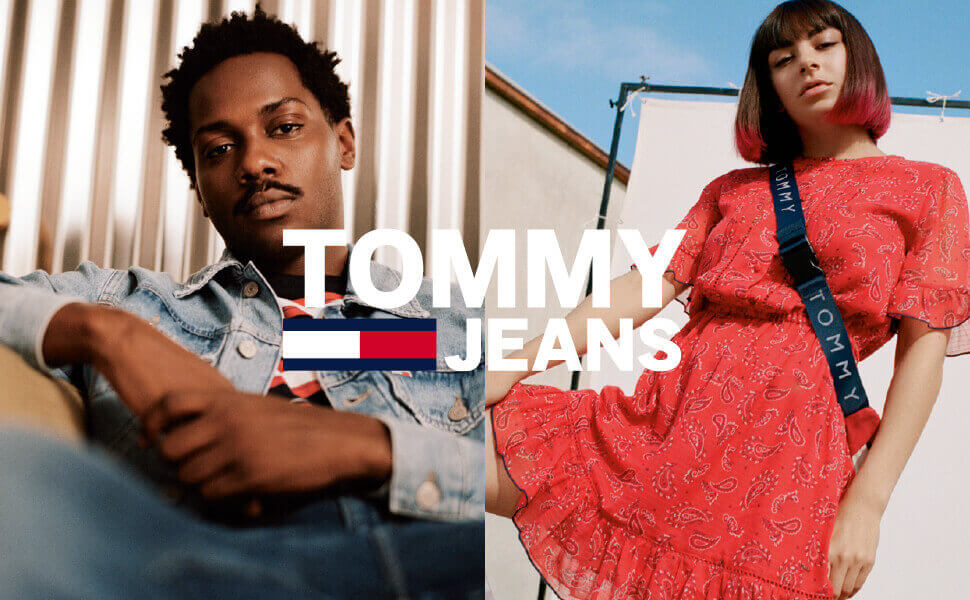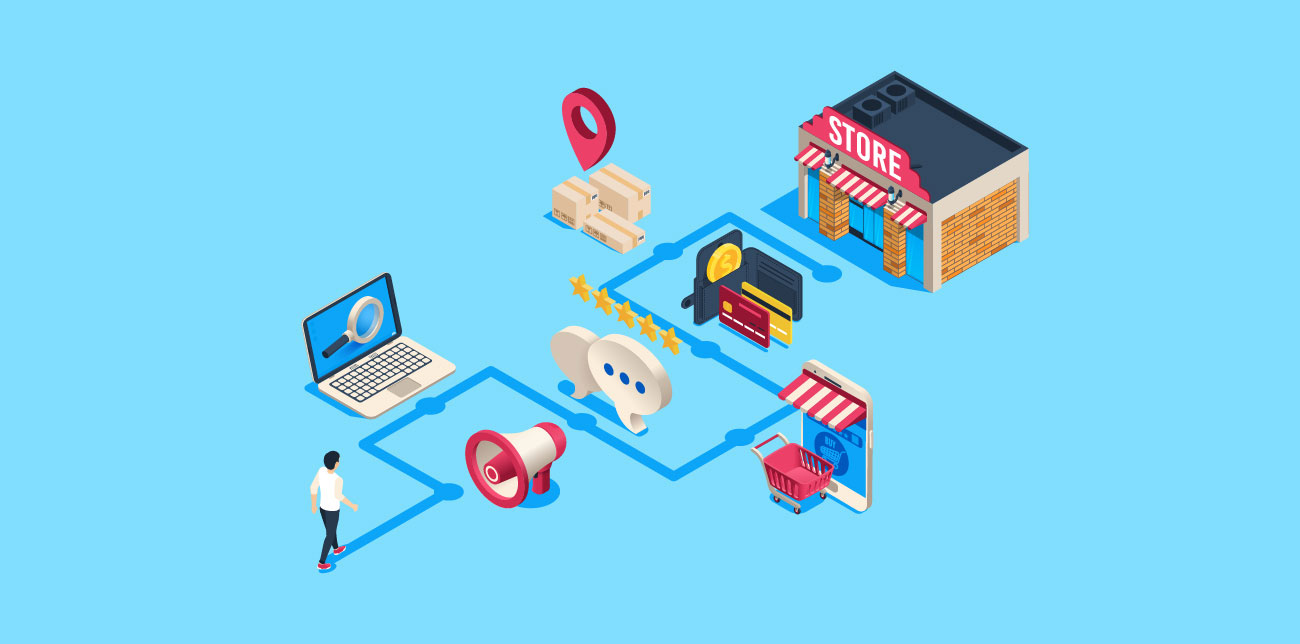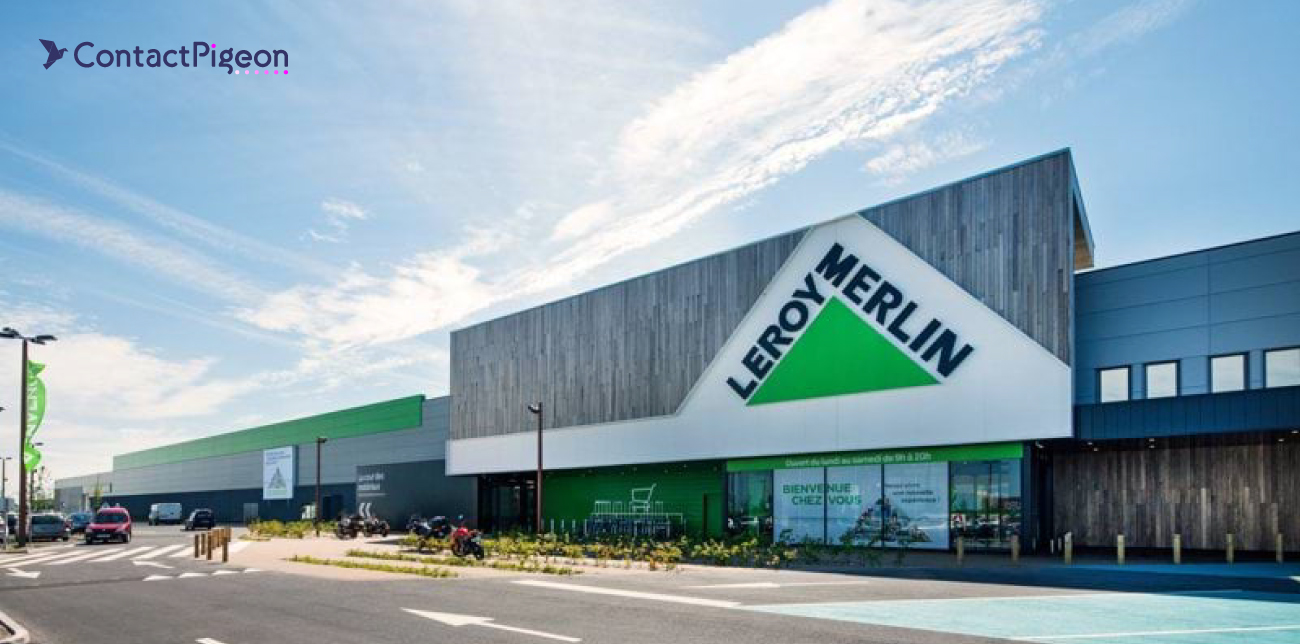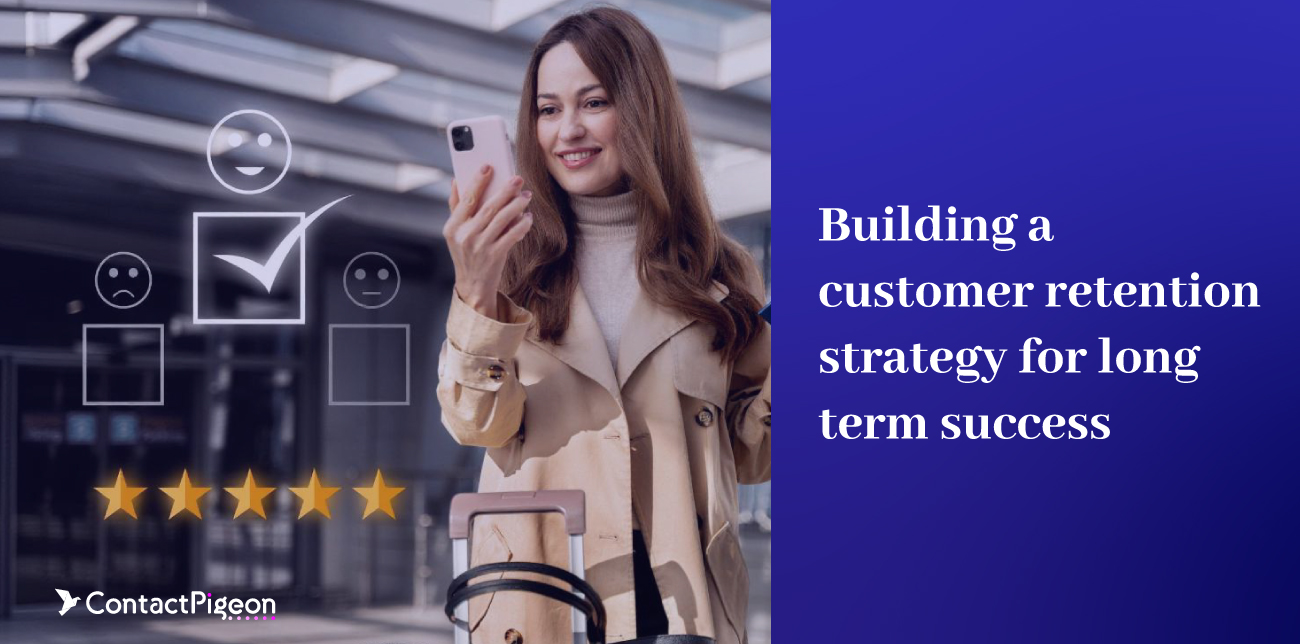eCommerce and online shopping didn’t only change the fundamentals of retail, they also changed consumer behavior. Modern customers are evolved, informed, and have extremely high standards. Moreover, supply is abundant, so if a brand does not meet the desired demands, customers will find another company that does. 75% of customers say that they prefer brands to use their advertisements and offers to create a personalized shopping experience. Additionally, customers will agree to have phone apps track their activity to receive targeted ads, specific to their interests.
Therefrom, it is safe to deduce that a lasting personalized shopping experience is preferred and in the end, proves to be mutually profitable. The customers get a memorable impression from the brand and the brand acquires happy and loyal customers. Brand loyalty and CLV are a careful composite of personalized customer satisfaction and product optimization. Retailers must take both these factors into account when implementing their offline and online marketing strategies. The last piece of the conversion funnel puzzle is the ability to retain the existing customers and cultivate a long, fruitful relationship. In this article, we took a page out of the playbook of some well-known retail giants, intending to provide ample inspiration and food for thought.
Table of Contents
What is a personalized shopping experience?
A personalized shopping experience in retail is the result of coordinated sequences across various customer touchpoints, triggered by specific behaviors and assimilated data. This data consists of preferences and actions that indicate a choice in specific product families or attributes (gender, color, style, etc). The steps in the sequence are predetermined, but the data that shapes the sequence is highly personal and unique for each customer.
Customer engagement thrives on a personalized shopping experience because it is based on an emotional connection between the brand and the consumer. From simple activities to complicated customer engagement strategies fuelled by data collection, brands can individualize the way they communicate with and advertise to their customers.
Personalization is based on carefully planning each campaign, product, or service with the aim of appealing to each consumer’s personal taste and preference. Compiling data based on previous behavior or creating segments leads to targeted dynamic scenarios, product recommendations, and special discounts. Most importantly, eCommerce personalization refers to the entirety of the customer journey, should be found in every brand-consumer interaction, and requires dedication to the endgame.
Why do online personalized shopping experiences matter?
In essence, the reason why any retailer should insist on creating the best personalized shopping experience is, ultimately, conversions and growth. Surveys show that industry leaders in customer experience achieve approximately 17% revenue growth, whereas companies that lack the necessary skills reach only 3%.
Brands that get this right see a huge improvement in customer loyalty and spending per customer — an average of 10-20% less on marketing efforts overall. Personalization works because it shows customers that a brand values loyalty and cares about their needs as individuals. This helps brands improve their CLV (customer lifetime value) in the long term; the personal approach develops the brand-customer relationship, inspiring loyalty based on symbolic or tangible gains.
Brands that nailed the personalized shopping experience
It’s easy to overlook brands that are good at what they do. When brands are bad at personalizing the shopping experience, it stands out. But when a brand is good at what it does for its customers, the customers don’t even notice that it’s happening.
For businesses looking to recreate that success, it’s first necessary to identify what other brands are doing. From omnichannel advertising strategies to personal product consultants, here are a few examples of top shops around the world that got it right.
Very’s weather personalization strategy
Recently, Very implemented a new strategy in which they used their customer’s location data and real-time weather forecasts to showcase banner ads that uniquely suited their customers’ weather.
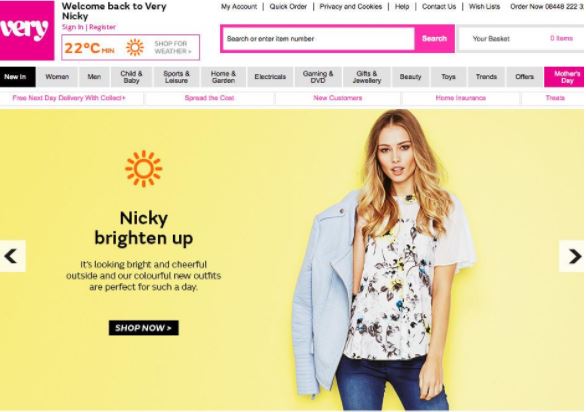
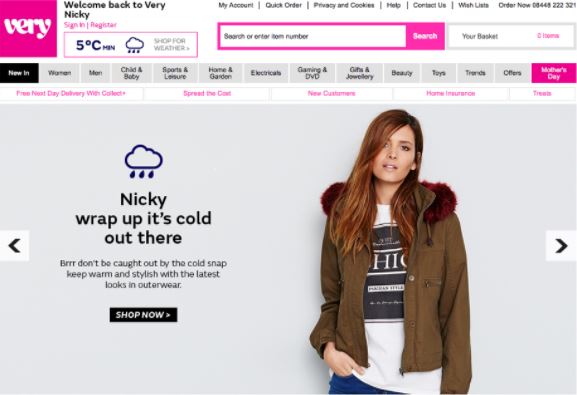
Why we liked it:
- It addressed a current retail problem: Very’s weather personalization strategy addressed a problem many retailers have: loss of sales during periods when the weather changes dramatically. By personalizing their ads based on a customer’s unique weather pattern, Very could limit these sales fluctuations.
- It targeted their demographic: In addition to customizing ads based on their customer’s locations, Very also used their target demographic — females between the ages of 25 and 44 — to determine where their ads would be placed. This level of personalization doesn’t just prevent Very from spending unnecessary money on advertising. It also shows their target audience that the brand understands the topics that matter most to their customers, cementing their image of Very as being relevant to them.
- It’s perfect for mobile users: Since more than half of all web traffic comes from mobile devices, personalized shopping experiences that take the needs of mobile users into account are a great idea. Very’s weather-based advertising integrates seamlessly with a mobile experience.
John Lewis’s personal styling service
John Lewis takes the idea of personal styling service one step further and modernizes the online shopping experience. Customers can choose whether they want to work with a professional stylist in-store or virtually via web calls. John Lewis’s personal stylists walk customers through their current wardrobe and make suggestions based on the individual’s unique style and needs.

Why we liked it
- It is a
- Customers can create a personalized wish list: The stylists are trained and can offer personalized wish lists to customers to bring them one step closer to purchasing the suggested items. However, they’re careful to never step across the line or cause the customers discomfort.
- Menswear personal styling is an option: John Lewis understands the fashion business in depth. They knew very quickly that they should run a separate personalized styling service for men — so they did.

Amazon’s personal shopping experience
Amazon’s customers have the ability to put together a list of items to try based on their style preferences. Then, they have seven days to assess the selected items, decide what they want to buy, and return unwanted items for free.
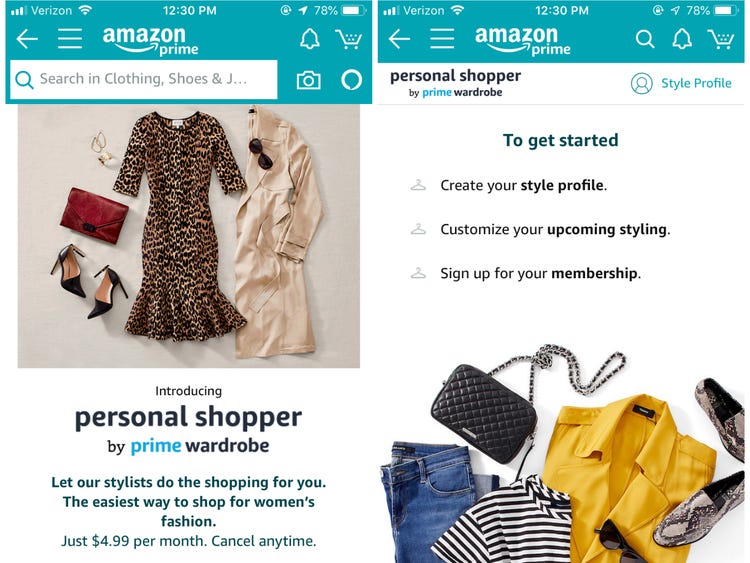
Why we liked it
- There’s a personalized shopping experience gift: We love that Amazon’s personal shopper program allows customers to have multiple profiles for everyone in their family. Though customers can only get one profile styled at a time, it makes it easy to give personalized clothing options to a family member as a gift.
- It addresses a common customer concern with online retailers: One reason customers may prefer to shop in brick-and-mortar stores versus online is that physical retailers allow them to try items on before they buy them. By offering free returns, Amazon simulates this shopping experience while allowing customers to remain in the comfort of their own homes.
- It creates a uniquely customized experience: Amazon really put the word “experience” in the phrase “customized shopping experience.” It’s as if they asked themselves, “What are the best experience gifts we can give our customers?” and went from there. Each month, customers get the joy and delight of reviewing the customized wardrobe an Amazon stylist selected just for them. This is the level of personalization that really makes an impression on a customer, causing them to look forward to the opportunity to spend money with Amazon.
Selfridges 2-hour styling consultations
Selfridges allows customers to book a 2-hour appointment with one of their style consultants in an exclusive suite with privacy, food options, and relaxation spaces. The brand curated the shopping experience for high-end shoppers with luxury tastes.

Why we liked it
- The consultants are multilingual: Selfridges makes it a point to hire style guides who speak multiple languages, providing not just a top shop personal experience London natives will love, but one that people visiting London will love as well. Although they cater to high-end clients, they don’t limit themselves to clients who speak English. Instead, they offer the same luxury service to every guest who books a personalized shopping consult with them.
- The service goes above and beyond: Selfridges clients have a preference for exclusivity. Their above-and-beyond customer service experience perfectly addresses the needs of their target audience, making their customers feel like they’re getting the VIP treatment every time they book a consulting experience through Selfridges.
- There are separate experiences for men and women: Male and female shoppers are often looking for different experiences. Selfridges knows that and offers personalized shopping experiences unique to their male and female customers. The male suites are designed to emulate a gentleman’s club, while the female space is designed in homage to female icons of the 20th century.
Rituals’ digital transformation
Recently, Rituals Cosmetics has flipped its business model. They’ve put an increased focus on digital content and improved the online shopping experience to better match the in-person shopping experience with beautiful storytelling across their website. Additionally, they offer 1:1 personalized shopping experiences in all of their stores and exclusive gifts for Rituals Members.

Why we liked it
- It rewards customer loyalty: Rituals knows the value of repeat customers. They offer gifts each month exclusive to Rituals members, ensuring that those members feel valued and inspired to check out the store regularly.
- Their versatility meets changing needs of their customers: Before the pandemic, Rituals didn’t have 1:1 personalized shopping available for their customers. They first started the service on a limited basis to meet the needs of customers who enjoyed that personalized service in stores but were reluctant to seek them out because of the pandemic. The success of the pilot program inspired Rituals to offer the service at all of their locations. This shows customers that Rituals understands their shifting needs and desires and that they’re willing to make changes to address those needs.
- They focus on emotion: Rituals Cosmetics focuses their online store on telling stories and showing how their cosmetics work into people’s daily lives. They connect to customers on an intimate, personal level by focusing on daily self-care rituals rather than just on the products they sell.
Mamas and Papas shopping experience
Mamas and Papas offers complimentary personal consultants for parents looking to meet the needs of their children. Customers can book consults in person or via video chat from the comfort of their homes.
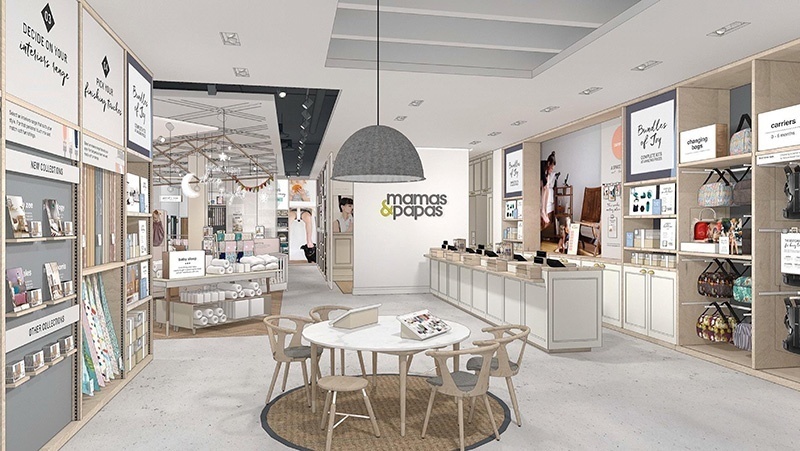
Why we liked it
- There is expert advice for their target audience: The personal shopping experience Mamas and Papas offers is perfect for their target audience. By booking a 1:1 consultation, parents can ask questions and describe their lifestyle needs, all while Mamas and Papas experts showcase their products to a captive audience.
- They reward customers for using their consultation service: Not only does Mamas and Papas offer their personalized shopping experience for free, but they actively reward users who choose the experience. They offer coupons up to £400 for customers who use their service and place a large enough order. This makes it clear that Mamas and Papas doesn’t just offer the service — they truly want their customers to use the service and get the most out of it.
- The price match: Price matching services are a great way to lock in customers who are looking for the best deal. It allows them to work with your brand even when they’ve found a better deal at another store, which can keep more product sales in-house.
Sephora’s shopping experience
Sephora offers limited-time personal shopping during the holidays, where shoppers can meet with a free consultant and take care of all their holiday cosmetic needs in one fell swoop.
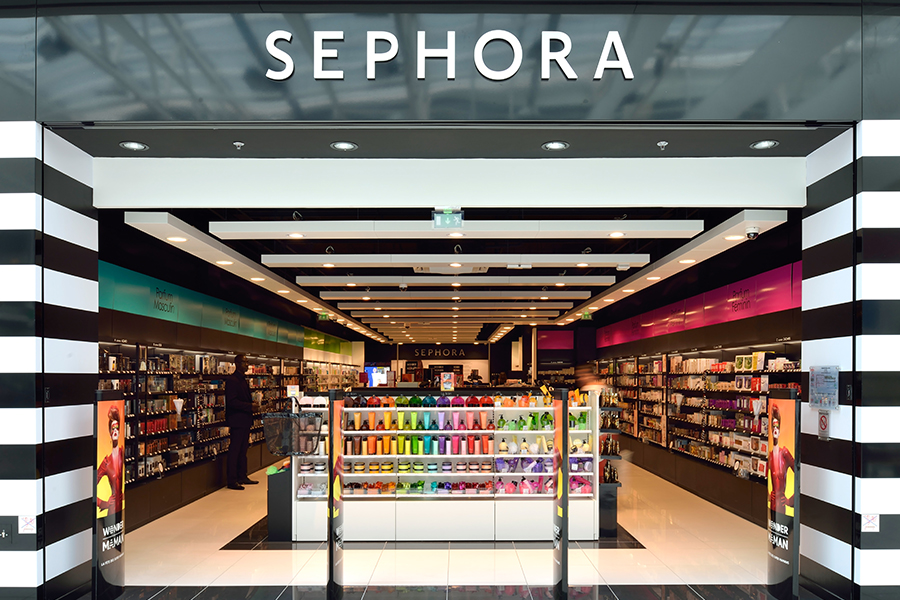
Why we liked it
- The ideal timing for reluctant shoppers: During the holiday season, Sephora’s stores can become packed fast. Sephora understands this and offers their personal shopping experience during their busiest months. This strategy is designed to address the needs of any customers who have questions and might be anxious about pulling an associate aside during the business’s prime operating hours.
- The customized gift options: What is a personalized customer experience? Try engraving your customers’ names on their favorite perfume bottles! Sephora takes their personalization options to the next level, making it easy to use their products as meaningful gifts while ensuring customers keep coming back to refill their favorite cosmetic containers.
- The mobile app integration: Services, like the limited holiday consultants or area events, are often advertised within Sephora’s mobile app. This omnichannel integration rewards the loyal customers who download Sephora’s apps while subtly encouraging them to come into the store to experience unique services.
Debenhams shopping experience
Debenhams recently closed their in-person stores so that they could focus more of their time, energy, and money on improving customer experiences online. Among their customer-first strategies is the increased use of influencers to advertise their content.
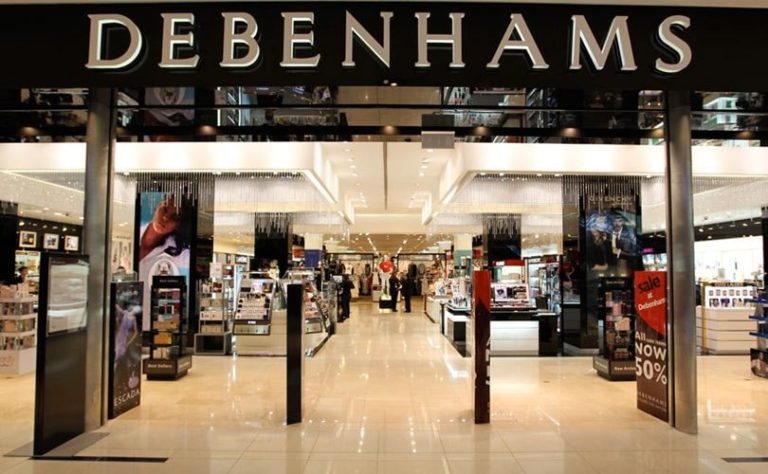
Why we liked it
- It creates a connection for buyers: Brands use influencers because they work. Viewers follow certain people on Instagram or YouTube because they feel a personal connection with them. By leveraging that pre-existing connection, Debenhams can attract a new audience or further engage the existing one.
- The products are sorted by needs: Debenhams offers “shop by style” sections on their website, mimicking the experience of customers looking at how items are styled on a rack while modernizing that experience for their new online presence.
- They have interactive review forms: Debenhams asks insightful questions on their review forms, which helps customers leave more detailed product reviews. This helps new customers make decisions about products and feel confident before they make purchases.
Apple’s shopping experience
Apple has spent years cultivating a unique brand that cares about its customers. Enter any of their stores, and their Genius Bar is available not just to sell you products but also to give you technical advice and help you with any problems you may be having. They offer customer support throughout their products’ entire lifespan.
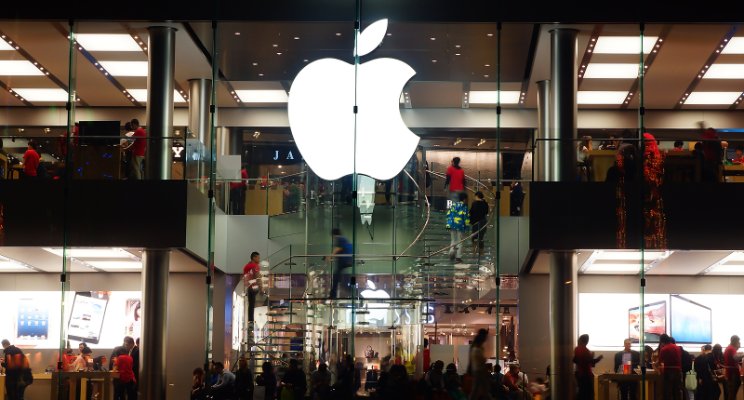
Why we liked it
- It builds brand loyalty: Apple’s “Genius Bar” works because its job isn’t to sell products. Its job is to nurture relationships with existing customers and provide the support they need throughout their product’s lifetime. When it’s time to replace their item, customers have an easier time saying “yes” to Apple because they know Apple will continue to support them in a way that other tech brands don’t.
- They find the right products for their customers: Apple doesn’t push its employees to upsell products. Instead, they’re encouraged to help customers find the right product for their personal needs — even if that’s not the most expensive product in the store. This means that they’re actually listening to the needs of their customers regularly.
- The experience is similar in and out-of-store: Apple is amazing at providing a consistent brand experience regardless of whether customers are interacting with them in stores or online. They even have an Apple Support App, allowing customers to engage in the “Genius Bar” experience in a 100% mobile format.
Nordstrom’s shopping experience
One of the things Nordstrom is best known for is offering quality customer service, whether it’s for shopping online or in-person. Online, they offer product recommendations based on previous store interactions, helping to locate the products most likely to be loved. In-store, they provide styling services most often associated with luxury retailers.

Why we liked it
- The focus is on convenience: Nordstrom places the convenience of its customers at the forefront of their minds when designing stores. They even created a 24/7 BOPIS (buy-online, pickup-in-store) model for their all-men’s Manhattan storefront, allowing customers in the city center to pick up orders at their convenience.
- They put the ‘personal’ in personal stylists: At some of their locations, Nordstrom offers not just personal stylists, but personal stylists who will go directly to a customer’s home to provide the service. They also offer alterations and adjustments so that their customer’s clothes fit perfectly every time.
- They value inclusivity: Nordstrom knows that not all customers look or act the same way. That’s why they’ve been intentional with how they appeal to different cultures, diversity, and inclusivity in recent years, using in-depth interviews and workshops to address the needs of their customers and their employees.
DSW’s shopping experience
Using customer engagement best practices, DSW tries to deliver the best products to its customers based on collected data. This data-driven decision-making process aids the brand to determine which products should be included in its physical stores. Innovative strategies, including nail bars and customized store layouts, allow them to stay competitive in the ever-changing retail market. Online, they engage with customers at each stage in the buying process to ensure a unique experience for each of their customers.
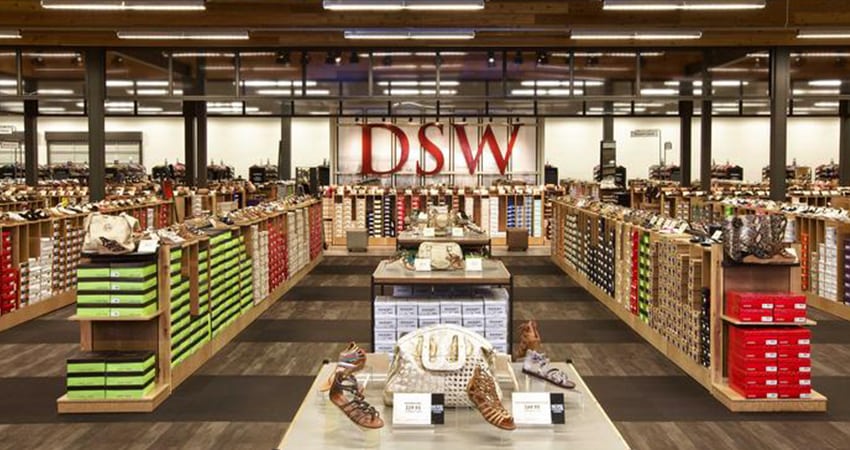
Why we liked it
- They communicate directly with customers: DSW understands that their customers are at the heart of their products. When they onboard a new customer, they ask detailed questions about the customer’s style, needs, and preferences. This helps them make valuable recommendations in the future. DSW ensures that the personalization options they focus on are truly meaningful and make an impact on the customer.
- They bring customers into stores: When DSW realized that they weren’t getting as many in-person customers as they used to, they strategized and created an incentive to bring customers back into stores. Nail bars and shoe repair services provide customers with meaningful experiences that also encourage them to shop in person.
- They focus on change: DSW has built its brand on the idea that they change with the seasons and the needs of their customers. This flexible business model allows them to make updates in real-time based on the feedback from their customers without changing the overall image of their brand.
Tip: Discover more examples on how to improve customer engagement in retail here.
The best experience always was, is, and will be personal
Looking at the ways top retail brands engage with their customers can inspire brands to do more. But the most important thing to remember is that personalized shopping experiences are just that: personal. No two brands can create these experiences the exact same way. It takes creativity and versatility to offer the personalization levels exhibited by retail leaders.
The best way to create an experience unique to a specific brand is to get to know the customers’ needs. In-depth market research, customer surveys, and analysis of customer interactions are critical to getting this right. Only a brand that fully understands its customers’ needs and wants can begin to offer omnichannel support and a unified shopping experience across all its interactions with its customers.
To offer meaningful changes that customers notice, executives have to be willing to do things differently. Brands that are best at creating a personalized experience aren’t afraid to partner with other industry experts to design innovative omnichannel experiences their customers remember. ContactPigeon has significant experience in helping numerous brands in the Eastern Europe region engage their customers meaningfully. To learn more about how ContactPigeon can help your brand use personalization options and increase customer engagement, book a free 30-minute consultation with one of our customer engagement specialists today.
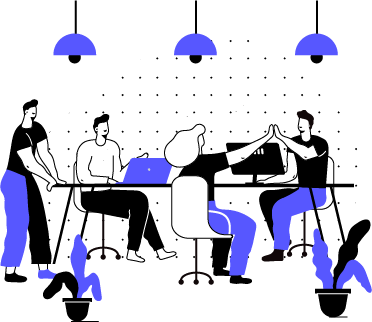
Let’s Help You Scale Up

